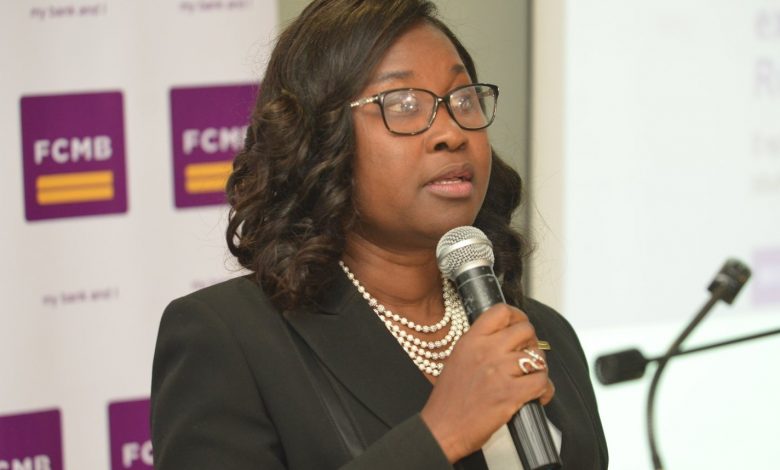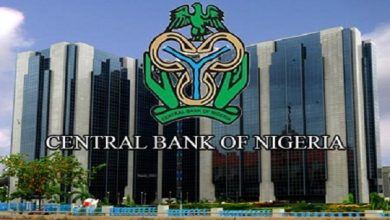THE ROLLER COASTER FORTUNES OF FCMB

When FCMB’s net income hit N22b in the financial year 2014 after years of lethargic and stunted fortunes it raised a lot hope and optimism .However that hope appears to be turning to a deep-seated despair now ..Is its management asleep at the switch ?
This question may not be farfetched. First City Monument Bank Plc ,FCMB, was a model brand on arrival in 1982 when it was established by Otunba Subomi Balogun ,a banking legend and trailblazer ; it was a fleet footed corporate organization nurtured to make a difference with superior service delivery and impressive financial performance from its inception with a core value to pursue excellence.
But today , it is a different ball game with its lethargic profitability .The 2008 and 2009 financial meltdown that hit the bank hard was the strong litmus test to its managerial sinecure . In 2013, a flash of hope of its recovery from the meltdown was raised .The Managing Director, FCMB Group then , Peter Obaseki alluded to this at its AGM when he declared 2013 as marking ‘the end of the recovery phase of (the) group, after the financial turmoil and meltdown of 2008 and 2009”. 2013 was also the year the bank achieved the milestone of a trillion naira balance sheet, leaving glimpses of what is possible within the bank, which has the vision of attaining the status of ‘the premier financial services group of African origin’ .
But its fortunes backtracked dramatically after the 2014 financial year .. Since then, slow growing gross earnings and hefty provisioning due to the past profligacy coalesced into big drops in profits and it has never hit that net income mark till date ‘
FCMB bank with stunted steps , cyclical profitability and lethargic speed , has been overtaken by younger ones miles away. The bank has failed to move to the next level of the tier one banks where its contemporaries are and even among the tier 2 rank ,it is yet to prove not to be a catch-up player . This, no doubt , is raising serious concerns and questions against its leadership potentials .
FCMB Q3 ,2021 :Lethargic and Flat Performance
The above scenario seems to continue and no respite yet . With the release of the less inspiring ,flattish and lethargic third quarter result for 20 21 , the hope for a better and impressive full year 2021 for the First City Monument Bank , FCMB, becomes somehow ,at least unpredictable , if not very remote ; but this may not spring any surprise after all the bank’s profit profile over the years has been on a roller coaster mode.Can this bank break this jinx and beat its 2014 records?
.Net Income is a critical metric that reflects full business results of any commercial bank .and this is where every investor beams his or her searchlight .FCMB’s Q3 ,2021 ,net profit was down , albeit at a negligible pace; the red ink blotting its progress in the full year 2020 could not be dabbed off leaving only despair of another stay outside the black lines of strong profitability. Moreover , other Comprehensive Income (OCI) including exchange translation and fair value reserve also played a spoiler role as its total comprehensive income further put the hope on hold backtracking further .Sequel to this ,the financial year 2021 also portends a repeat of another stunted season .
Rather than incremental improvements ,FCMB needs some fundamental improvements at both its top and bottom lines to facilitate its change of status from a catch up organization to the leadership position even as a tier-2 lender. Its revenue grew merely by 2.1% to N149.5bn from N146.4bn in the previous quarter., Profit before tax grew merely by 0.7 % at N15.7bn., Profit after tax stood at N13.8bn.,down by 0.7% .FCMB’s net incomes in the last five years have been moving back and forth without any outstanding break or pace forward .Between 2016 and 2020 its net incomes were N14.3b, N8.6b, N14.97b,N17.3b and N19.6b .These figures were a big disappointment to a high hope raised in 2014 financial year when its net profit hit N22b and its investors are becoming restless with it .From the look of things on those not content to follow, who desire to rewrite the rules of the game ,unafraid of orthodoxy, more inclined to build than to cut , those concerned to make the difference than making career and those who absolutely committed to staking out the future first can turnaround FCMB.
FCMB AND ITS PROFIT ENGINE
The problem with FCMB according to some analysts is lack of resourcefulness not resources .This may not farfetched. Although it is a tier 2 lender ,size is not the same thing as efficiency .Moreover, getting to the future first is more a function of resourcefulness than resources .Size is not a principal measure of any corporate organization or management’s beauty . FCMB could be a leader among tier 2 lenders if it is an efficient user of resources . In a nutshell, bigness without stretch and leverage is obesity just smallness without stretch and leverage is impotence. Principally , a cursory view of its results over the last few years confirms its inability to manage down its costs effectively and control risks that is inherent in maturity transformation ,the banking core business.
Profitability , no doubt , is a quality of its profit engine and strategic choices . When a company appears to be more interested in protecting the past than creating the future ,takes industry structure as a given and rarely challenges the prevailing conventions it may remain a laggard .FCMB by its performances over years needs a strategic turnaround .A company with leadership intention spends less time worrying about how to position itself in existing competitive space and more time creating fundamentally new competitive space .Moreover ,the race to competition should be perceived as a race to build competencies not simply to gain immediate market share . In the current dispensation, a new competitive realities have ruptured industry boundaries, overthrown much of standard management practice, and rendered conventional models of strategy and growth obsolete .One does not need to bow to sentiments putting your relations or sons in strategic positions to satisfy self interests . Diamond Bank plc ,now acquired by Access Bank Plc tried a similar experiment and burnt its fingers .Whether by commission or omission , the experience is not usually impressive in any company where family sentiments are favored in Nigeria
Some analysts believe a key challenge rendering FCMB less competitive is nothing but managerial malfeasance . The view is that starting resource positions are very poor predictor of future industry leadership. A firm can sit atop mountain of cash and command legions of talented people, and still lose its preeminent position. Likewise, a firm can sometimes overcome resource handicaps and successfully scale the heights of industry leadership Without a strong leadership with strong foresight, stretch, and leverage which provide the energy and rationale for proactive advantage building and industry re-engineering ,FCMB may remain a catch player . This appears to be Achilles heel of FCMB and it is a function of its current profit engine .
A look into its profit engine confirms this as much .To know the strengths and weaknesses of a bank or its management or get a view of its profit engine , the best pointers are mirrored by its income mix . There are three principal components of any bank’s incomes including incomes from its core or lending ,fee and commissions and trading activities .
OUTRAGEOUS COST TO INCOME TRADITION
Its Q3 , 2021 ,performance is an exemplar of its profit engine and it mirrors strengths and weaknesses .A key drawback of its profitability is its traditionally high cost to income ratio.. . Its operating expenses rose 11% Year-on-Year to ₦73.2 billion in the nine months of 2021, largely due to increased regulatory costs which accounted for 44% of total cost growth However in the third quarter 2021, its cost to income ratio stood a t 75.% . Cost-to-income ratio is the measure of the costs of running a company in relation to its operating income. The higher the ratio, the greater the risk of zero profitability. Between 2015 and 2019 this ratio ranged from 79.00%,56.30% ,67.80% ,70.70% and 69.40% . The negative impacts of this on its bottom line have been very enormous and have been damaging to its leadership dream
INTEREST INCOME
A drawback of FCMB competitiveness is inability to get a competitive spread from its business of maturity transformation. This is either because it cannot manage down the cost of funds well or rev up its yields on earnings assets impressively . Also, the issue of its loan loss impairment over the last few years is mind boggling . A banker is best rated by his or her ability to lend safely and profitably not necessarily by the bank’s volume of assets or equity ,though they could enhance performance too .Core banking activities are critical to any bank’s profitability and survival ; it can form upwards of 60% of operating income, and for smaller banks like FGMB it reaches 80% or more.
.But this is the most difficult terrain for banks and where the men are separated from the boys in banking management .. That is the major reason why all eyes are on Interest income, or net interest income (NII), the main source of revenue for the majority of banks worldwide ; but NII is sensitive to both credit risk and market risk ; market risk is essentially interest-rate risk for loans and deposits. Interest-rate risk will be driven by the maturity structure of the loan book, as well as the match (or mismatch) between the maturity of the loans against the maturity of the funding , known as the interest-rate gap. In a declining or low interest-rate environment, banks may suffer from negative NII irrespective of their asset–liability maturity profile, as it becomes more and more difficult to pass on interest rate cuts to depositors
To perform better its competitors , a bank must be able to control risks ,yields and cost. All these manifest in the cost of risks ,loan loss impairments ,yields on earning assets and the cost funds .Only a bank blessed with sound management that understands the nitty-gritty of this terrain could deliver the bulk . FCMB is still finding this terrain a hard nut like many others and this is confirmed by its weak net interest margin profile ; it needs an iron teeth to break it .
WEAK NET INTEREST MARGINS AS BIG HEADACHE
For better understanding of a bank strength in the interest income segment , one profitability ratio that tells the story fully is net interest margin. To prove itself here , a bank must boost its earnings assets or posses a large heart for risk and do so efficiently
FCMB, no doubt , has large heart for risk . This is indicated by its high loan-to-deposit ratio (LDR) . Between 2015 and 2019 its LDR ranged between 84.70% ,99.30% ,94.20%, 77.00% and 75.59% . It may be risky if the ratio is too high as it means that the bank may not have enough liquidity to cover any unforeseen fund requirement . However ,while the management of FCMB has not allowed this trend to tamper with its liquidity positions , it is not exploiting the potentials engendered by its yearly increase in its earning assets . This was repeated in Q3,2021. In third quarter of 2021, its Loans and advances grew, 22% Year-on-Year and 6% Quarter-on-Quarter to ₦967.6 billion in Sep 2021 . Naturally , increase in earning assets is expected to boost its gross earnings , but this is not so as its gross earnings grew meagerly .The bank’s gross revenue of ₦149.4 billion for the nine months ended September 2021, was a 2% growth from ₦146.4 billion for the same period prior year. The key drawback on its fortunes its inability to cut cost as shown in its higher interest expenses that inched by 14 % compared to its interest income .which rose by 3.3% Yon Y in the third quarter 2021
The negative impact of this is seen on its net interest income as it dropped by 4% year on year net from ₦68.1 billion, as at 9M 2020, to ₦65.4 billion for 9M 2021. This ultimately led to a decrease in Net Interest Margin to 6.9% from 7.6% year on year .Its NIM was 8.1% in the full year 2020 ..Between 2015 and 2019 ,it ranged from7.70% ,8.30% 8.30%,7.60% and 7.10% This means that for every N100 of invested assets the bank made less than N9 of income after all interest expenses had been paid.
This means not much is coming out to boost its gross revenue or earnings despite big heart for risks The reason behind the lethargic incomes from the earning assets may not be far to seek . FCMB’s cost of fund is too high to give it a competitive spread and yields on assets could not rescue they are too low due to a low interest prevailing environment .The latter is a big factor too though some banks still managed their yields up well and cost of funds down well to get a competitive spread . . . Between 2016 and 2018 it cost of funds were 6.10% ,6.80% and 6.80 respectively And its cost of funds has been in that high bracket till date and its yields too . .
The above is the outcome interest rate risk battle for which high cost funds and low yields on earning assets remain the major handicap for FCMB . Asides this , the credit risk battle is also a tall ambition .Though its nonperforming loans ratios are mostly within the regulatory minimum ,however , the issue of loan loss impairments are another drawbacks killing its potential profitability . Between 2015 and 2019 nonperforming loan ratios were . 4.15%,3.70%,4.90% ,5.90% and 3.70 respectively ..However , its net loans loss impairments rose by 62.3 % from N13.8b to N22.3b in the financial year 2020 .Also , its Net impairment loss on financial assets decreased by 39.4% Year-on-Year to ₦8.1 billion, for the nine months ended September 2021, from ₦13.3 billion for the same period in the prior year. These the viruses infesting the bank’s profitability though its loan loss impairments were managed down to N4.8 b from N13.3b in Q3 in 2021
IMPRESSIVE FEE AND COMMISSION INCOMES AS RESCUE FACTOR
But FCMB’s management seems to know where to exploit cheap revenues to fill the gaps elsewhere . Ordinarily , fees and commissions income segment is the consolation price for all banks . A good manager of a financial firm or bank usually rev up this non interest income item of its balance sheet because it holds the key to stabilizing earnings especially at a time when interest rate volatility is a factor
FCMB proved a unique skill in this segment inQ3, 2021 as in the past ..Although the fee and commission income for the Q3,2021 was up by 15.3% to N25.6B from N22.2 b ,however , its fee and commission expenses moved in the opposite direction declining by 26% to N5.4b from N7.3 b . The impact of this is an overwhelming increase of 36% in its Net fee and commission income in the third quarter ,2021 to N20.3b from N15 b
But this should not spring any surprise . Fee income is very popular with bank senior management because it is less volatile and not susceptible to market risk like trading income or NII. There is also no credit risk because the fees are often paid up front. There are other benefits as well, such as the opportunity to build up a diversified customer base for this additional range of services.
TRADING INCOME AS A SPOILER
The bank, however, came up modestly in its trading income ,another difficult terrain . Net trading income inched by 15% to N6.6b from N5.7b ,741 ; but in absolute the amount this could not bridge the gap created by lethargic performance in the core income segment
Asides this, a disastrous performance or nil income from Net income from financial instruments mandatorily measured at fair value through profit or loss against N19.3b registered in the corresponding period of 2020 dragged down its fortunes in Q3. This negativity was intensified by a 98 % crash in Other revenue to N94m from N4.96b
The negative impacts of the above managerial malfeasance are vividly seen on its less competitive margins ,earning per share ,net profit ,returns on equity and assets as well as its market value as indicated above






